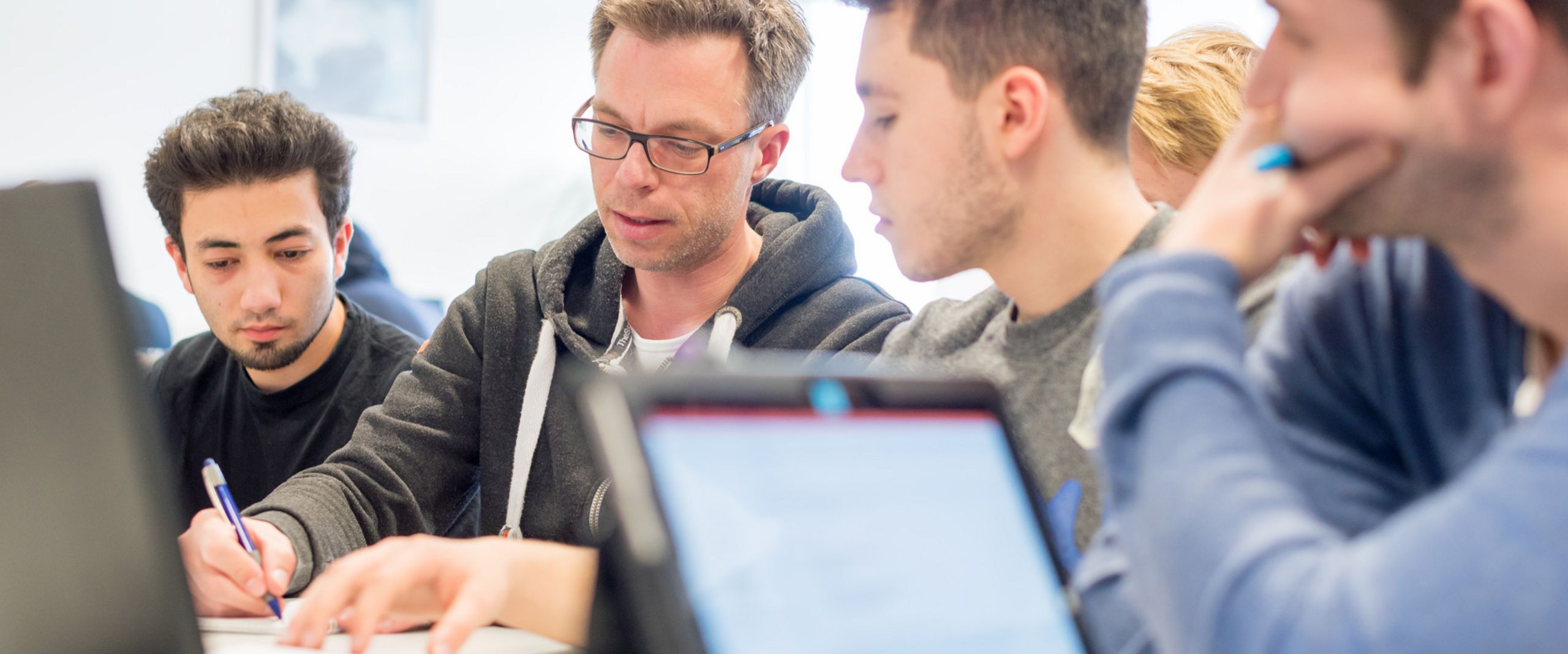
Fakultät Elektrotechnik und Informatik
Sie wollen Praxiserfahrung in einem Unternehmen sammeln? Der Studiengang "Technische Informatik" ist eng verzahnt mit diesem Studiengang, allerdings können Sie hier gleichzeitig Praxiserfahrung und Auslandserfahrung passend zum Studiengang sammeln. Steigen Sie jetzt die Karriereleiter hoch!
| Degree | Bachelor of Science |
|---|---|
| Standard period of study | 7 semesters |
| Credits | 210 |
| Accredited | Ja |
| Admission restricted | No |
| Admission requirements | Der Studiengang läuft aus. Es werden keine Studierenden mehr aufgenommen. |
| Language of instruction | German |
| Faculty/institution | Fakultät Elektrotechnik und Informatik |
| Integrated stay abroad | Yes |
Der Internationale Studiengang Technische Informatik ist mit dem nationalen Studiengang Technische Informatik eng verzahnt. Das Konzept des Studiengangs ist die technische Ausrichtung, eine „Informatik mit ingenieurmäßigem Selbstverständnis“. Dieses praxisorientierte Informatik-Studium ist in sieben Semester unterteilt. Das fünfte Semester ist dem Studienaufenthalt an einer Hochschule im europäischen oder außereuropäischen Ausland vorbehalten. Die internationale Ausrichtung des Studiengangs mit dem integrierten Auslandsstudium eröffnet den Absolvent:innen bessere Berufsperspektiven in Zeiten der Globalisierung und zunehmenden Internationalisierung der Unternehmen. Durch Projekte und Wahlpflichtmodule, die das Setzen individueller Schwerpunkte ermöglichen, und Labor-Praktika werden Schlüsselkompetenzen erworben bzw. ausgebaut. Das inhaltliche Wahlpflicht-Angebot ist stets mit den Forschungsaktivitäten der Lehrenden verknüpft. Gruppen- und Projektarbeit fördert die Sozialkompetenz der Studierenden. Modulbezogene Übungen zur Förderung der studentischen Eigenständigkeit dienen der Vermittlung von Lernstrategien und Methoden der Informationsgewinnung. Übrigens: Die Hochschule Bremen hat gleich mehrere passende Bachelor-Angebote: Je nach Interesse, können Sie das Studium auch nur national ausrichten oder dual studieren
Ab dem Wintersemester 2022/23 wird der Studiengang Informatik: Software- und Systemtechnik B. Sc. (klassisch, dual und international) angeboten.
„Studying in the International Computer Engineering programme makes me fit for the global job market in computer science and electrical engineering.“
Tim Wieborg Student in 5th semester
Today, it is difficult to imagine a world without digitalisation. This makes well-trained IT specialists all the more necessary and demand for graduates across the whole economy is greater than ever. As a result, graduates in computer engineering enjoy excellent career prospects. The professional field covers programming, the design and development of software systems as well as sales and service.
As a software engineer working in industry or in public institutions you could be involved in the design and development of software applications, the development of regulators and controls or the set-up and maintenance of computer systems and networks. Your expertise may also be sought after for the commissioning of automation equipment or after-sales support. The International Degree Programme in Computer Science B.Sc. also opens up the possibility to continue studying, for example in the Master's programme in Computer Science M.Sc.
The International degree Programme in Computer Engineering B.Sc. is divided into seven semesters and two fields of study: Applied Computer Science and Automation Engineering. It is closely interlinked with the degree programmes "Computer Engineering" with no stay abroad and "Automation / Mechatronics". Up to the 3rd semester, you can therefore easily switch between these programmes.
In the first year of study, you will learn general basics, i.e. mainly mathematics, electrical engineering, physics and computer science, programming as well as technical English.
In the third semester, you can specialise and choose between different modules depending on your field of study (automation technology or computer science) and further deepen your knowledge in the fourth semester. You will also advance your foreign language skills in a second English module. Depending on which specialisation you choose, you will take different modules:
Profile: "Automation Technology".
Here, the focus is on production automation and automation of energy systems, for example electrical machines, circuits of energy electronics, electric drives and robot systems.
Profile: "Applied computer science".
Here you learn all the basics, both in terms of hardware (digital technology, microprocessor technology, computer networks, computer structures) as well as software (operating systems, software technology, databases, modelling and simulation).
To ensure that the practice is not neglected despite all the theory, you can set your individual focus in (group) projects, elective modules and laboratory practicals. The elective courses are coordinated with the research activities of the lecturers, so that you are always very close to application-oriented research. In the fifth (or optionally the sixth) semester, you go abroad! HSB cooperates with many universities around the world.
In addition to honing your foreign language skills you also study subject-related content and the semester abroad develops your interpersonal competence: you make lots of new contacts, are immersed in other cultures and landscapes, all of which makes a valuable contribution to your CV.
The sixth semester prepares you for professional work as an engineer. In addition to the support module for the practical semester, you will be taught the basics of business administration with focus on company organisation, project management and principles of economic processes. The following semester is taken up with other elective modules, and you will also write your Bachelor's thesis in the seventh semester, which is accompanied by the colloquium. It is also possible to write the Bachelor thesis in cooperation with a company.
In the fifth (or optionally the sixth) semester, you study abroad. THE opportunity to gain new insights and experiences, to get to know other people and cultures and to deepen your language skills! There are numerous partnerships with many universities in Europe and worldwide. You can of course also ask for permission to look for a university abroad yourself. Our International Office will be happy to advise you.
Wherever you decide to go, you must successfully complete at least four modules, at least three of which are compulsory electives. In addition, you must also take the module Preparation and Follow-up Abroad, which consists of an online part and an attendance part (after your return) in the form of a seminar.

